Fleurs du Mal Magazine


Or see the index
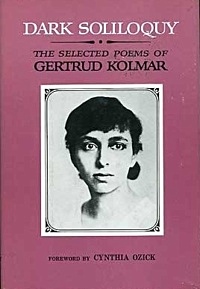
Komm
O komm.
Du amethystenes Gewölbe großer Nacht.
O komm.
Du goldgestickte Decke über süßen Broten.
O komm.
Sternsamen, aus dem himmlischen Getreide rieselnd sacht.
O komm.
Du kupferdunkle Schlange, die mit Lebensgeifer spritzt die Toten.
O komm.
Du überm Alltag schwebende, verzückte Melodie,
O komm.
Ich möchte einmal dich mit Lippen fassen, eh ich sterbe.
O komm.
Du meine braune Rose. Solche gab es nie.
O komm.
Du samtner Taumund voll unsäglich süßer Herbe.
O komm.
Grau riesenhafter Turm, der in die Öden floh.
O komm.
Ich duck mit Schleierkäuzen mich am Fenster ohne Scheibe.
O komm.
Du steinernes Gesetz, das bröckelnd stürzte irgendwo.
O komm.
Ich richte die geborstne Tafel auf an finstrer Eibe.
O komm.
Du Zauberspange, die der unverstandne Spruch durchflicht.
O komm.
Mein Haupt in Ruhe, meine Stirn in Schlaf zu schließen.
O komm.
Du blauer Brunnen, der aus jeder Blume eine schöne Iris bricht.
O komm.
Du Regenbogenweinen, grasgesäumtes Fließen.
O komm.
Mein Kind. O komm, o komm, du Kind.
O komm.
Mein hohler Paukenschlag kann mich nicht mehr betäuben.
O komm.
Und willst du nicht, so nimm mich in den Wind.
O komm.
Und laß mich überm Meere, Ockersand, verstäuben.
Gertrud Kolmar
(1894-1943)
gedicht: Komm
fleursdumal.nl magazine
More in: Archive K-L, Archive K-L, Kolmar, Gertrud

Komm
Du hast meinem Munde die reife Granatfrucht geschenkt,
Des Apfels starken Saft, erzeugende Kerne,
Hast in die Himmelsgründe kristallen wachsender Sterne
Wurzeln des Rebstocks versenkt.
Blau schwellen Trauben: koste.
Siehe, ich bin ein Garten, den du gen Abend erreicht,
Fiebrige Arme an schlanker silberner Pforte zu kühlen,
Im verstummten Geäst Aprikose zu fühlen,
Bin unterm südlichen Hauch, der die Ruhende streicht,
Eine schmale, blasse Wiese.
Erschauerndes Gräsergefilde, lieg ich bereit und bloß;
Mitternachtsglut schloß mir Lippen bebender Winde zu,
Doch die verborgenste Blüte öffnet den purpurnen Schoß:
Du.
Du … komm…
Spüre, ich bin die Frau; meine klugen Finger erfüllen
Milchiges Porzellan mit Gewürzen der Lust,
Gießen zaubrisches Naß. Du spreitest aus Hüllen
Schlagenden Fittich, taumelst an meine Brust,
Sinkst, ein großes, lastendes Glück, in Tiefen.
Sanfter nun trägt dich die Flut, streichelt lässig die Flanken
Wuchtendem Schiffe, das drüben im Hafen war
Mit ragenden Schornsteintürmen, Masten hoher Gedanken;
Fühlst du die Möwe wehn dir durch rauchig wirbelndes
Haar?
Gertrud Kolmar
(1894-1943)
gedicht: Komm
fleursdumal.nl magazine
More in: Archive K-L, Archive K-L, Kolmar, Gertrud
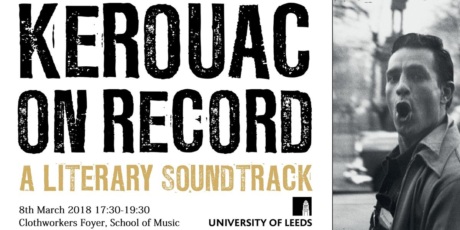
Out now:
Kerouac on Record ◊ A Literary Soundtrack
Edited by Simon Warner and Jim Sampas
Co-edited by Jack Kerouac’s nephew, including pieces written by Kerouac himself as well as interviews from major literary and musical figures including Allen Ginsberg, Lee Konitz and David Amram, Kerouac on Record gives a unique insight into how Kerouac brought his passion for jazz to his full creative output.
Kerouac on Record is the touchstone for the music of Kerouac – Kerouac’s love for music, the depth of its influence on his work, and the influence that his work continues to extend to waves of contemporary musicians, from David Bowie and Janis Joplin to Sonic Youth. It is a book rife with the work of cultural icons, essential for any fan of the Beat Generation and popular music alike.
About Kerouac on Record
He was the leading light of the Beat Generation writers and the most dynamic author of his time, but Jack Kerouac also had a lifelong passion for music, particularly the mid-century jazz of New York City, the development of which he witnessed first-hand during the 1940s with Charlie Parker, Dizzy Gillespie and Thelonious Monk to the fore.
The novelist, most famous for his 1957 book On the Road, admired the sounds of bebop and attempted to bring something of their original energy to his own writing, a torrent of semi-autobiographical stories he published between 1950 and his early death in 1969.
Yet he was also drawn to American popular music of all kinds – from the blues to Broadway ballads – and when he came to record albums under his own name, he married his unique spoken word style with some of the most talented musicians on the scene.
Kerouac’s musical legacy goes well beyond the studio recordings he made himself: his influence infused generations of music makers who followed in his work – from singer-songwriters to rock bands.
Some of the greatest transatlantic names – Bob Dylan and the Grateful Dead, Van Morrison and David Bowie, Janis Joplin and Tom Waits, Sonic Youth and Death Cab for Cutie, and many more – credited Kerouac’s impact on their output.
In Kerouac on Record, we consider how the writer brought his passion for jazz to his prose and poetry, his own record releases, the ways his legacy has been sustained by numerous more recent talents, those rock tributes that have kept his memory alive and some of the scores that have featured in Hollywood adaptations of the adventures he brought to the printed page.
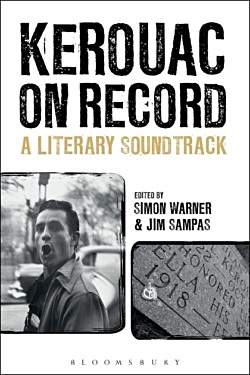 1. Jack Kerouac’s Jazz Scene Jim Burns – 2. 2nd Chorus: Blues: Jack Kerouac Larry Beckett – 3. Duet for Saxophone and Pen: Lee Konitz and the Direct Influence of Jazz on the Development of Jack Kerouac’s ‘Spontaneous Prose’ Style Marian Jago Interview 1: Lee Konitz Marian Jago – 4. Jack Kerouac Goes Vinyl: A Sonic Journey into Kerouac’s Three LPs: Poetry for the Beat Generation; Blues and Haikus; and Readings by Jack Kerouac on the Beat Generation Jonah Raskin – 5. Art Music: Listening to Kerouac’s ‘Mexico City Blues’ A. Robert Lee Interview 2: David Amram Pat Thomas – 6. Beat Refrains: Music, Milieu and Identity in Jack Kerouac’s The Subterraneans, the Metro-Goldwyn-Mayer Film Adaptation Michael Prince – 7. Bob Dylan’s Beat Visions (Sonic Poetry) Michael Goldberg – 8. Carrying a Torch for Ti Jean Paul Marion Interview 3: Richard Meltzer Michael Goldberg – 9. The Grateful Dead: Jack Manifested as Music Brian Hassett – 10. Driver Mark Bliesener – 11. Jim Morrison/Angel of Fire Jay Jeff Jones – 12. Light is Faster than Sound: Texans, the Beats and the San Francisco Counterculture Holly George-Warren – 13. Hit the Road, Jack: Van Morrison and On the Road Peter Mills – 14. Detecting Jack Kerouac and Joni Mitchell: A Literary/Legal (Not Musicological) Investigation into the Search for Influence Nancy Grace – 15. Kerouac and Country Music Matt Theado – 16. ‘Straight from the Mind to the Voice’: Spectral Persistence in Jack Kerouac and Tom Waits Douglas Field Interview 4: Barney Hoskyns Simon Warner – 17. From Beat Bop Prosody to Punk Rock Poetry: Patti Smith and Jack Kerouac; Literature, Lineage, Legacy Ronna Johnson Poems: Marc Zegans Interview 6: Allen Ginsberg Pat Thomas – 18. Tramps Like Them: Jack and Bruce and the Myth of the American Road Simon Morrison Interview 5: Graham Parker Pat Thomas – 19. Punk and New Wave James Sullivan – Interview 7: Jim DeRogatis on Lester Bangs James Sullivan – 20. The Tribute Recordings Jim Sampas and Simon Warner – Jack Kerouac Biography – Jack Kerouac Discography Dave Moore – Tribute Discography – Kerouac/Cassady Song List Dave Moore/Horst Spandler
1. Jack Kerouac’s Jazz Scene Jim Burns – 2. 2nd Chorus: Blues: Jack Kerouac Larry Beckett – 3. Duet for Saxophone and Pen: Lee Konitz and the Direct Influence of Jazz on the Development of Jack Kerouac’s ‘Spontaneous Prose’ Style Marian Jago Interview 1: Lee Konitz Marian Jago – 4. Jack Kerouac Goes Vinyl: A Sonic Journey into Kerouac’s Three LPs: Poetry for the Beat Generation; Blues and Haikus; and Readings by Jack Kerouac on the Beat Generation Jonah Raskin – 5. Art Music: Listening to Kerouac’s ‘Mexico City Blues’ A. Robert Lee Interview 2: David Amram Pat Thomas – 6. Beat Refrains: Music, Milieu and Identity in Jack Kerouac’s The Subterraneans, the Metro-Goldwyn-Mayer Film Adaptation Michael Prince – 7. Bob Dylan’s Beat Visions (Sonic Poetry) Michael Goldberg – 8. Carrying a Torch for Ti Jean Paul Marion Interview 3: Richard Meltzer Michael Goldberg – 9. The Grateful Dead: Jack Manifested as Music Brian Hassett – 10. Driver Mark Bliesener – 11. Jim Morrison/Angel of Fire Jay Jeff Jones – 12. Light is Faster than Sound: Texans, the Beats and the San Francisco Counterculture Holly George-Warren – 13. Hit the Road, Jack: Van Morrison and On the Road Peter Mills – 14. Detecting Jack Kerouac and Joni Mitchell: A Literary/Legal (Not Musicological) Investigation into the Search for Influence Nancy Grace – 15. Kerouac and Country Music Matt Theado – 16. ‘Straight from the Mind to the Voice’: Spectral Persistence in Jack Kerouac and Tom Waits Douglas Field Interview 4: Barney Hoskyns Simon Warner – 17. From Beat Bop Prosody to Punk Rock Poetry: Patti Smith and Jack Kerouac; Literature, Lineage, Legacy Ronna Johnson Poems: Marc Zegans Interview 6: Allen Ginsberg Pat Thomas – 18. Tramps Like Them: Jack and Bruce and the Myth of the American Road Simon Morrison Interview 5: Graham Parker Pat Thomas – 19. Punk and New Wave James Sullivan – Interview 7: Jim DeRogatis on Lester Bangs James Sullivan – 20. The Tribute Recordings Jim Sampas and Simon Warner – Jack Kerouac Biography – Jack Kerouac Discography Dave Moore – Tribute Discography – Kerouac/Cassady Song List Dave Moore/Horst Spandler
Simon Warner
is a journalist, lecturer and broadcaster who teaches Popular Music Studies at the University of Leeds in the UK. He has, over a number of years, written live reviews and counterculture obituaries for The Guardian and The Independent, and has a particular interest in the relationship between the Beat Generation writers–Jack Kerouac, Allen Ginsberg, William Burroughs and others–and rock culture. His previous books include Rockspeak: The Language of Rock and Pop (1996) and Howl for Now: A Celebration of Allen Ginsberg’s epic protest poem (2005). – Writes: Popular Music, North American Literature – Author of : Kerouac on Record, Text and Drugs and Rock ‘n’ Roll
Jim Sampas
is a music and film producer. His musical works often focuses on major cultural figures such Jack Kerouac (who is his Uncle), The Beatles, Bruce Springsteen, The Smiths, Bob Dylan, and The Rolling Stones. He has persuaded a galaxy of stars to partake of a unique aesthetic marriage, as vintage works are resurrected in contemporary arrangements in projects covered by such major news outlets as People Magazine, NPR, The New York Times, Entertainment Weekly, Rolling Stone, and many others. – Writes: Popular Music, North American Literature – Author of: Kerouac on Record
Following Text and Drugs and Rock ‘n’ Roll: The Beats and Rock Culture (2013), Simon Warner partners with Literary Executor of the Estate of Jack Kerouac, Jim Sampas, to go deeper into his exploration of the connections between the great figures of the Beat generation and the music of the so-called ‘rock era.’ Interspersed with exclusive interviews of the likes of Lee Konitz, Graham Parker, Lester Bangs, and Allen Ginsberg, the twenty chapters are signed by an impressive array of journalists, music industry professionals, rock critics, writers, film makers and academics from all over the world. Addressing such issues as the influence of jazz on Kerouac’s ‘spontaneous prose’ style, the lineage between his ‘Beat bop prosody’ and Patti Smith‘s ‘punk rock poetry,’ or his inspiring ‘the myth of the American road’ in Bruce Springsteen’s lyrics, they shed light on what appears to be a two-way relationship between popular music and the work of the author of On the Road. As Warner puts it: ‘if, for Kerouac, it was jazz that would have the principal impact, then it was rock on which the writer would have the main effect.’” – Olivier Julien, Lecturer in the History and Musicology of Popular Music, Paris-Sorbonne University, France
Kerouac on Record
A Literary Soundtrack
By: Simon Warner, Jim Sampas
Published: 08-03-2018
Format: Hardback
Edition: 1st
Extent: 480
ISBN: 9781501323348
Imprint: Bloomsbury Academic
Dimensions: 229 x 152 mm
RRP: £28.00
Kerouac on Record
A Literary Soundtrack
fleursdumal.nl magazine
More in: # Music Archive, #Beat Generation Archives, - Book Stories, Archive G-H, Archive G-H, Archive K-L, Archive K-L, Art & Literature News, AUDIO, CINEMA, RADIO & TV, Bob Dylan, Dylan, Bob, Ginsberg, Allen, Jim Morrison, Joni Mitchell, Kerouac, Jack, Patti Smith

Du
Du. Ich will dich in den Wassern wecken!
Du. Ich will dich aus den Sternen schweißen!
Du. Ich will dich von dem Irdnen lecken,
Eine Hündin! Dich aus Früchten beißen,
Eine Wilde! Du. Ich will so vieles –
Liebes. Liebstes. Kannst du dich nicht spenden?
Nicht am Ende des Levkojenstieles
Deine weiße Blüte zu mir wenden?
Sieh, ich ging so oft auf harten Wegen,
Auf verpflastert harten, bösen Straßen;
Ich verdarb, verblich an Glut und Regen,
Schluchzend, stammelnd: “. . . über alle Maßen . . .”
Und die Pauke und das Blasrohr lärmten,
Und ich kam mit einer goldnen Kette,
Tanzte unter Lichtern, die mich wärmten,
Schönen Lichtern auf der Schädelstätte.
Und ich möchte wohl in Gärten sitzen,
Auch den Wein wohl trinken aus der Kelter,
Doch die Lider klafften, trübe Ritzen,
Und ich ward in Augenblicken älter.
Und auf meinen Leichnam hingekrochen
Ist die Schnecke träger Arbeitstage,
Zog den Schleimpfad dünner grauer Wochen,
Schlaffer Freude und geringer Plage.
In den Wäldern bin ich umgetrieben.
Ich verriet den Vögeln deinen Namen,
Doch die Vögel sind mir ferngeblieben;
Wenn ich weinte, zirpte keiner: Amen.
Und die Scheckenkühe an den Rainen
Grasten fort mit seltnem Häupterheben.
Da entfloh ich wieder zu den Steinen,
Die mir dieses Kind, mein Kind nicht geben.
Einmal muß ich noch im Finstren kauern
Und das Göttliche zu mir versammeln,
Es beschwören durch getünchte Mauern,
Seinem Ausgang meine Tür verrammeln,
Bis zum bunten Morgen mit ihm ringen.
Ach, es wird den Segen nimmer sprechen,
Nur mit seinem Schlag der erznen Schwingen
Diese flehnde Stirn in Stücke brechen…
Gertrud Kolmar
(1894-1943)
gedicht: Du
fleursdumal.nl magazine
More in: Archive K-L, Archive K-L, Kolmar, Gertrud

Nächte
Deine Hände keimen in Finsternissen,
Und ich seh nicht, wie sie blühn,
Atmend aus dem Schnee der Kissen.
Meeresgrün,
Wogengrau verglitzern deine Augen;
Meine Wange leckt ihr Schaum.
Nelkenrote Quallen saugen . . .
Süßes Harz von weißem Birkenbaum
Tropft die Stille goldbraun nieder . . .
O breiter Flügel, zuckender Schulter entstiegen !
O bleicher Schwanenflügel, der mich beschattet!
O Nacken, flaumige Brust, o Leib, den ein Wiegen
Verschilfter Bucht umschläfert, zärtlich ermattet !
Libellensirrendes Wispern . . .
Gertrud Kolmar
(1894-1943)
gedicht: Nächte
fleursdumal.nl magazine
More in: Archive K-L, Archive K-L, Kolmar, Gertrud
In this magisterial study of the relationship between illness and art, the best-selling author of An Unquiet Mind, Kay Redfield Jamison, brings an entirely fresh understanding to the work and life of Robert Lowell (1917-1977), whose intense, complex, and personal verse left a lasting mark on the English language and changed the public discourse about private matters.
 In his Pulitzer Prize-winning poetry, Robert Lowell put his manic-depressive illness (now known as bipolar disorder) into the public domain, creating a language for madness that was new and arresting. As Dr. Jamison brings her expertise in mood disorders to bear on Lowell’s story, she illuminates not only the relationships among mania, depression, and creativity but also the details of Lowell’s treatment and how illness and treatment influenced the great work that he produced (and often became its subject).
In his Pulitzer Prize-winning poetry, Robert Lowell put his manic-depressive illness (now known as bipolar disorder) into the public domain, creating a language for madness that was new and arresting. As Dr. Jamison brings her expertise in mood disorders to bear on Lowell’s story, she illuminates not only the relationships among mania, depression, and creativity but also the details of Lowell’s treatment and how illness and treatment influenced the great work that he produced (and often became its subject).
Lowell’s New England roots, early breakdowns, marriages to three eminent writers, friendships with other poets such as Elizabeth Bishop, his many hospitalizations, his vivid presence as both a teacher and a maker of poems—Jamison gives us the poet’s life through a lens that focuses our understanding of his intense discipline, courage, and commitment to his art. Jamison had unprecedented access to Lowell’s medical records, as well as to previously unpublished drafts and fragments of poems, and she is the first biographer to have spoken with his daughter, Harriet Lowell. With this new material and a psychologist’s deep insight, Jamison delivers a bold, sympathetic account of a poet who was—both despite and because of mental illness—a passionate, original observer of the human condition.
Kay Redfield Jamison is the Dalio Family Professor in Mood Disorders and a professor of psychiatry at the Johns Hopkins University School of Medicine, as well as an honorary professor of English at the University of St. Andrews in Scotland. She is the author of the national best sellers An Unquiet Mind, Night Falls Fast, and Touched with Fire, and is the coauthor of the standard medical text on bipolar disorder, Manic-Depressive Illness: Bipolar Disorders and Recurrent Depression. Dr. Jamison is a Fellow of the American Academy of Arts and Sciences and the Royal Society of Edinburgh and is a recipient of the Lewis Thomas Prize, the Sarnat International Prize in Mental Health from the National Academy of Medicine, and a John D. and Catherine T. MacArthur Fellowship. She is married to Thomas Traill, a cardiologist at the Johns Hopkins School of Medicine.
Robert Lowell, Setting the River on Fire
A Study of Genius, Mania, and Character
By Kay Redfield Jamison
Literary Figure Biographies & Memoirs
Paperback
Feb 06, 2018
560 Pages
$18.95
Published by Vintage
ISBN 9780307744616
new books
fleursdumal.nl magazine
More in: - Book News, Archive I-J, Archive K-L, Archive K-L, BIOGRAPHY, DRUGS & DISEASE & MEDICINE & LITERATURE, Robert Lowell
Op zondag 11 maart is de première van de documentaire Dichter tegen de tijd, een portret van Jasper Mikkers, te zien in de Nieuwe Vorst, Willem II-straat, Tilburg. Aanvang 16.00 uur. Na de vertoning vindt aldaar ook de presentatie plaats van zijn nieuwe bundel Nachtleven, met illustraties van Daisy Karthaus.
 Jasper Mikkers (Oerle, 1948) debuteerde in 1974 onder het pseudoniem Tymen Trolsky bij de Bezige Bij met de roman Hyacinta en Pasceline. Bij dezelfde uitgeverij verschenen later datzelfde jaar maar liefst drie dichtbundels .Na de onthulling van zijn pseudoniem in 1976 volgden nog vele publicaties, zowel onder de naam Tymen Trolsky als zijn echte naam. Naast dichtbundels onder meer het reisboek De weg van de regen (1990), de verhalenbundel De kleine jongen en de rivier (1994), en de romans Het einde van de eeuwigheid (2000) en Karl Marx Universiteit (2009).
Jasper Mikkers (Oerle, 1948) debuteerde in 1974 onder het pseudoniem Tymen Trolsky bij de Bezige Bij met de roman Hyacinta en Pasceline. Bij dezelfde uitgeverij verschenen later datzelfde jaar maar liefst drie dichtbundels .Na de onthulling van zijn pseudoniem in 1976 volgden nog vele publicaties, zowel onder de naam Tymen Trolsky als zijn echte naam. Naast dichtbundels onder meer het reisboek De weg van de regen (1990), de verhalenbundel De kleine jongen en de rivier (1994), en de romans Het einde van de eeuwigheid (2000) en Karl Marx Universiteit (2009).
In de periode 2013-2015 was hij stadsdichter van Tilburg; hierover schreef hij de bundel Gespiegelde stad (2015).
Nachtleven is de derde dichtbundel die hij publiceert bij de bibliofiele uitgeverij Brandon Pers, eerder verschenen Kwatrijnen (1979) en De landmeters van de keizer (2002).
Nachtleven is in meer dan een opzicht een opvallende bundel. Zoals de dichter zelf in het voorwoord schrijft: ‘Aanzet tot het schrijven van deze bundel lag in het idee dromen die regelmatig terugkwamen vast te leggen’. En wat deze uitgave zeker zo bijzonder maakt zijn de erin opgenomen tien prachtige aquarellen van Daisy Karthaus die aansluiten bij de thematiek van de tweeëntwintig sonnetten.
Nachtleven is een dichtbundel van Jasper Mikkers met tien aquarellen van Daisy Karthaus. Wilt u verzekerd zijn van een exemplaar van Nachtleven dan kunt u reserveren bij de secretaris van de Brandon Pers (via cvanraak@online.nl )
De prijs bedraagt euro 17,50 (excl. Porto) en de oplage is 140 exemplaren.
fleursdumal.nl magazine
More in: - Book Lovers, - Book News, Archive K-L, Archive M-N, Art & Literature News, Illustrators, Illustration, Jasper Mikkers, Mikkers, Jasper
Gathered on the occasion of Robert Lowell’s one hundredth birthday, New Selected Poems offers a fresh and illuminating representation of one of the great careers in twentieth-century poetry.
 The renowned and controversial author of many books of poems, plays, and translations, Lowell was one of the United States’ most honoured poets, winning the Pulitzer Prize in Poetry in 1947 and 1974, the National Book Award, and the National Book Critics Circle Award.
The renowned and controversial author of many books of poems, plays, and translations, Lowell was one of the United States’ most honoured poets, winning the Pulitzer Prize in Poetry in 1947 and 1974, the National Book Award, and the National Book Critics Circle Award.
His ongoing interrogation of his family legacy, his personal struggle with manic depression, and his mastery of the tradition of poetry in English formed the groundbreaking autobiographical foundation of Life Studies (1959) and the books that followed it, including For the Union Dead (1964), Near the Ocean (1967), History (1973), and Day by Day (1977).
Katie Peterson’s incisive selection of Lowell’s poems draws attention to ‘the perishability of life, its twinned quality of fragility and repetition, as framed by the structured evanescence of daily consciousness.’ Lowell’s own intense dramas and struggles are the substrate he drew on in his restless search to make sense of, and fix, shape-shifting experience – not his, but ours. As Peterson says, Lowell was ‘constitutionally immune to any stultifying permanence either of form or of spirit.’ Her brilliant new reading of Lowell shows us his work constantly breaking, renewing, transforming, as he strives restlessly, over and over, to find an elusive unity.
Robert Lowell (1917-1977) was born in Boston. He was recognised as an accomplished poet in his own lifetime, and along with Elizabeth Bishop, John Berryman and Sylvia Plath he created the fashion and generated the force of American poetry over the 1950s, 60s, and 70s. Life Studies, published in 1959, marked a watershed. It initiated an autobiographical project which would dominate his oeuvre thereafter, and is now regarded as one of the most influential books of the century. He received a Pulitzer Prize for Lord Weary’s Castle (1946) and another for The Dolphin (1973).
New Selected Poems
by Robert Lowell (Author),
Katie Peterson (Editor)
ISBN 9780571339488
Format Paperback
Published 03/08/2017
Length 272 pages
£14.99
Publisher: Farrar, Straus and Giroux
Language: English
ISBN-10: 0374251339
ISBN-13: 978-0374251338
new poetry books
fleursdumal.nl magazine
More in: - Book News, Archive K-L, Archive K-L, Art & Literature News, Robert Lowell
Lucebert verscheen als een komeet, zo schreef Gerrit Kouwenaar, en maakte zich binnen vijf jaar als dichter en later als schilder waar. Tot op de dag van vandaag wordt hij gezien als een van de grootste dichters in ons taalgebied.
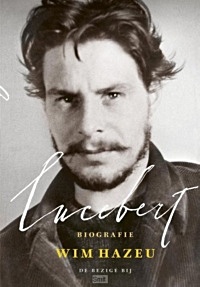 Kouwenaar schreef ook: ‘Wij zijn allemaal van de oorlog, het leed en hoge tonen.’ Wat dat voor Lucebert (1924-1994) betekende, beschrijft Wim Hazeu in deze meeslepende biografie, die voor een deel gebaseerd is op eerder ontoegankelijke of onbekende bronnen. Lucebert is het levensverhaal van een gepassioneerde dichter en beeldend kunstenaar.
Kouwenaar schreef ook: ‘Wij zijn allemaal van de oorlog, het leed en hoge tonen.’ Wat dat voor Lucebert (1924-1994) betekende, beschrijft Wim Hazeu in deze meeslepende biografie, die voor een deel gebaseerd is op eerder ontoegankelijke of onbekende bronnen. Lucebert is het levensverhaal van een gepassioneerde dichter en beeldend kunstenaar.
Deze meeslepende en onthullende biografie is ook het schokkende verhaal van een allesbepalende oorlog die daaraan voorafging. Het is het verhaal van worsteling en succes. Het is het verhaal van het naoorlogse artistieke leven, waarin Lucebert verzet aantekent tegen autoriteiten die politiek en kunst bij het oude willen laten.
Het is het verhaal over de dichters en kunstenaars die Lucebert omringden: Bertus Aafjes, Armando, Hans Andreus, Karel Appel en talloze anderen. En het is een verhaal over liefde en geliefden, over avonturen in Amsterdam, Bergen, Berlijn, Frankrijk, Italië en Spanje. Het leven van Lucebert was complex, en dit stelde Wim Hazeu voor vraagstukken die hij als biograaf nog niet eerder had hoeven oplossen.
Wim Hazeu (1940) was na zijn studie Nederlands werkzaam als journalist, radio- en televisieprogrammamaker en uitgever.
Publiceerde naast verschillende romans en dichtbundels omvangrijke biografieën van Achterberg, Slauerhoff (bekroond met de biografieprijs van de Dordtse Academie), M.C. Escher en S. Vestdijk (op deze biografie is hij aan de Groningse Universiteit gepromoveerd).
Ook bezorgde hij de briefwisseling tussen S. Vestdijk en Henriëtte van Eyk, Wij zijn van elkaar (2007). In 2012 verscheen zijn biografie over Marten Toonder waarvoor hij toegang kreeg tot de nalatenschap van Marten en Jan Gerhard Toonder en Toonders vrouw Phiny Dick.
Auteur: Wim Hazeu
Titel: Biografie Lucebert
Aantal pagina’s: 976
Uitvoering: Gebonden
ISBN10 9403104708
ISBN13 9789403104706
Taal: Nederlands
Onderwerp: Literaire non-fictie
Uitgever: Uitgeverij De Bezige Bij b.v.
Druk: 1
Verwacht: 7 februari 2018
Prijs: €39,99
new books
fleursdumal.nl magazine
More in: #Biography Archives, #Editors Choice Archiv, - Book News, - Book Stories, Archive G-H, Archive K-L, Archive K-L, Art & Literature News, Lucebert, Lucebert
Insel, the only novel by the surrealist master Mina Loy, is a book like no other—about an impossible friendship amid the glamorous artistic bohemia of 1930s Paris.
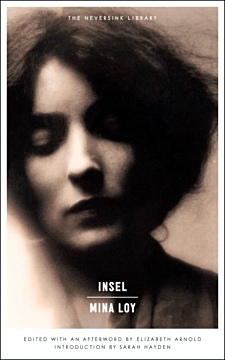 German painter Insel is a perpetual sponger and outsider—prone to writing elegant notes with messages like “Am starving to death except for a miracle—three o’clock Tuesday afternoon will be the end”—but somehow writer and art dealer Mrs. Jones likes him.
German painter Insel is a perpetual sponger and outsider—prone to writing elegant notes with messages like “Am starving to death except for a miracle—three o’clock Tuesday afternoon will be the end”—but somehow writer and art dealer Mrs. Jones likes him.
Together, they sit in cafés, hatch grand plans, and share their artistic aspirations and disappointments. And they become friends. But as they grow ever closer, Mrs. Jones begins to realize just how powerful Insel’s hold over her is.
Unpublished during Loy’s lifetime, Insel—which is loosely based on her friendship with the painter Richard Oelze—is a supremely surrealist, deliberately excessive creation: baroque in style, yet full of deft comedy and sympathy. Now, with an alternate ending only recently unearthed in the Loy archives, Insel is finally back in print, and Loy’s extraordinary achievement can be appreciated by a new generation of readers.
Mina Loy was born in London in 1882 and began her artistic career as painter; she was influenced by Impressionism and achieved success in the Parisian art world before turning to poetry and other forms of visual art, including lampshades and “junk collages.” She was at the heart of the modernist movement (as well as Dada, Futurism, and Surrealism) and had close friendships with Djuna Barnes and Gertrude Stein, among many others. Her frank and rigorously experimental writing earned her both praise and censure, as did her unconventional life: she spent many years living in Greenwich Village and on the Bowery, befriending bums, drunks, and other down-and-outs. Her work has recently been collected inThe Lost Lunar Baedeker (FSG) and Stories and Essays of Mina Loy (Dalkey Archive). She died in 1966 in Aspen, Colorado.
Elizabeth Arnold, a scholar and poet, is the author of Effacement and two other collections.
Sarah Hayden is a postdoctoral fellow at the University of Cork, where her focus is on Mina Loy and avant-garde artistic movements.
Insel
Mina Loy
Edited by Elizabeth Arnold,
with an Introduction by Sarah Hayden
Trade Paperback
Novel, 2014
180 pages
ISBN 9781612193533
Publisher Melville House
Part of The Neversink Library
“Is there anyone in America except you, Bill [William Carlos Williams,] and Mina Loy who can write anything of interest in verse?” — Ezra Pound, letter to Marianne Moore
fleursdumal.nl magazine
More in: - Book Lovers, Archive K-L, Archive K-L, Art & Literature News, Loy, Mina, SURREALISM
#1 New York Times bestseller Milk and Honey is a collection of poetry and prose about survival. About the experience of violence, abuse, love, loss, and femininity.
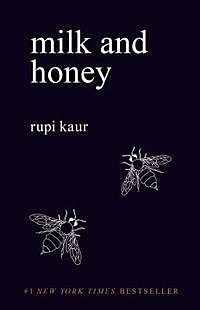 The book is divided into four chapters, and each chapter serves a different purpose. Deals with a different pain. Heals a different heartache. Milk and Honey takes readers through a journey of the most bitter moments in life and finds sweetness in them because there is sweetness everywhere if you are just willing to look.
The book is divided into four chapters, and each chapter serves a different purpose. Deals with a different pain. Heals a different heartache. Milk and Honey takes readers through a journey of the most bitter moments in life and finds sweetness in them because there is sweetness everywhere if you are just willing to look.
rupi kaur is a bestselling author and illustrator of two collections of poetry. her artistic expression began at the age of 5 when her mother handed her a paintbrush and said—draw your heart out. while studying at the university of waterloo rupi self-published her first collection milk and honey in 2014.
milk and honey became an international phenomenon that’s been translated into over 30 languages and sold over 2.5 million copies. rupi’s long-awaited second collection the sun and her flowers was published in 2017 and immediately debuted as a #1 global bestseller. through her poetry rupi explores a variety of themes ranging from love. loss. trauma. healing. femininity. migration. revolution.
rupi is a storyteller and chronicler. there’s a simplicity and nuance to her work that has found a home in the hearts of millions. this magic is best captured in her stage performances which are magnetic musical interactions of poetry art and theatre. in the years to come rupi hopes to continue her artistic exploration through art and poetry—searching for ways to understand and articulate the world around her.
Milk and Honey
by Rupi Kaur
Publisher Andrews McMeel Publishing
Publication date 10/2015
US Edition
Binding Trade Paperback
208 pages
Price € 13.50
ISBN 9781449474256
new poetry books
fleursdumal.nl magazine
More in: - Book Lovers, - Book News, Archive K-L, Archive K-L, Art & Literature News, Kaur, Rupi
De Academie De Gouden Ganzenveer kent de Gouden Ganzenveer 2018 toe aan de Zuid-Afrikaanse dichteres Antjie Krog.
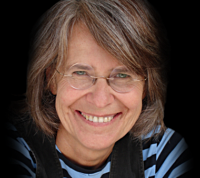 Gerdi Verbeet, Academievoorzitter De Gouden Ganzenveer maakte afgelopen zaterdag de laureaat bekend in het radioprogramma De Taalstaat. De Academie De Gouden Ganzenveer eert Krog als een bijzondere en veelzijdige dichteres, als een uitzonderlijk integer schrijfster en journaliste, en als een begenadigd performer van haar eigen werk.
Gerdi Verbeet, Academievoorzitter De Gouden Ganzenveer maakte afgelopen zaterdag de laureaat bekend in het radioprogramma De Taalstaat. De Academie De Gouden Ganzenveer eert Krog als een bijzondere en veelzijdige dichteres, als een uitzonderlijk integer schrijfster en journaliste, en als een begenadigd performer van haar eigen werk.
De prijsuitreiking vindt plaats op donderdag 19 april a.s. in Amsterdam. Een weerslag van deze bijeenkomst wordt vastgelegd in een speciale uitgave, die in de loop van het jaar zal verschijnen.
De Academie, een initiatief van het bestuur van stichting De Gouden Ganzenveer, kent jaarlijks deze culturele prijs toe. De leden zijn afkomstig uit de wereld van cultuur, wetenschap, politiek en het bedrijfsleven. Met deze onderscheiding wil de Academie het geschreven en gedrukte woord in het Nederlands taalgebied onder de aandacht brengen.
Voorgaande laureaten zijn Arnon Grunberg, Xandra Schutte, Geert Mak, David Van Reybrouck, Ramsey Nasr, Annejet van der Zijl, Remco Campert, Joke van Leeuwen, Adriaan van Dis, Joost Zwagerman, Tom Lanoye, Peter van Straaten, Maria Goos, Kees van Kooten, Jan Blokker en Michaël Zeeman.
Uitgebreide informatie is te vinden op www.goudenganzenveer.nl
De Zuid-Afrikaanse Antjie Krog (1952) is een gelauwerd dichter, schrijver en academicus. Krog debuteerde in 1970 op achttienjarige leeftijd met de dichtbundel Dogter van Jefta. Inmiddels is ze uitgegroeid tot een van de belangrijkste dichters van Zuid-Afrika.
Haar poëzie is persoonlijk, zintuiglijk en sterk geëngageerd: Krog dicht over het moederschap en het ouder worden, maar ook over de diepe verbondenheid en de worsteling met de ongelijkheid en het racisme in haar land. Krog kreeg bekendheid in Nederland door haar vele optredens bij Poetry International, de Nacht van de Poëzie en het festival Winternachten. Talrijke poëzieliefhebbers raakten in de ban van haar ongewone, ontroerende en klankrijke poëzie.
In 1999 publiceerde uitgeverij Atlas een bloemlezing uit haar werk onder de titel Om te kan asemhaal. Daarna zijn haar dichtbundels bij uitgeverij Podium verschenen. Zij schreef ook proza, bijvoorbeeld Country of my Skull (in het Nederlands: De kleur van je hart, 1998/2000), toneelstukken en non-fictie. De roman Mond vol glas van Henk van Woerden en het toneelstuk Mamma Medea van Tom Lanoye vertaalde zij van het Nederlands naar het Afrikaans.
Antjie Krog is buitengewoon hoogleraar Letteren en Filosofie aan de Universiteit van de Westkaap. Haar werk is veelvuldig bekroond, onder andere met de prestigieuze Hertzogprijs, de Reina Prinsen Geerligsprijs, de Pringle Award, de Alan Paton Award. Op donderdag 19 april a.s. neemt zij de Gouden Ganzenveer 2018 in ontvangst.
Laureaat Gouden Ganzenveer 2018: Antjie Krog
foto: Karina Turok
fleursdumal.nl magazine
More in: Antjie Krog, Archive K-L, Archive K-L, Art & Literature News, Awards & Prizes, Literary Events, Racism
Thank you for reading Fleurs du Mal - magazine for art & literature